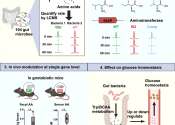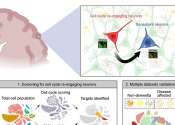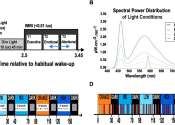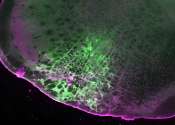Last update:
Genetics
High-potency cannabis use is tied to epigenetic changes, study suggests
A study published in Molecular Psychiatry is the first to suggest that the use of high-potency cannabis leaves a distinct mark on DNA, providing valuable insights into the biological impact of cannabis use. High-potency cannabis ...
12 hours ago
1
158
Oncology & Cancer
Immunotherapy boosts survival of advanced Hodgkin lymphoma in clinical trial
A treatment that rallies the immune system to destroy cancer raised the survival rate for advanced Hodgkin lymphoma patients to a remarkable 92%, suggesting a new standard therapy for the disease. The New England Journal ...
9 hours ago
1
75
Medical research news
COVID study reveals virus-induced inflammation during pregnancy, redefines vertical transmission
A new Cleveland Clinic-led study published in The EMBO Journal shows that mild and asymptomatic SARS-CoV-2 infections can trigger immune responses in a pregnant individual that may cause serious inflammatory responses in ...
9 hours ago
0
69

Team identifies origin of deadly ovarian cancer
Researchers have identified the origin of ovarian cancer that develops in the fallopian tube, which opens doors to discovering new methods for diagnosing the disease and potential therapies.
9 hours ago
0
20

Kidney transplantation among those with HIV infections shown to be safe and effective
It is just as safe and effective for people with HIV in need of kidney transplantation to get their organ from donors who are also HIV positive as it is from donors who are not infected with the virus, a new study shows. ...
9 hours ago
0
9

AI models help redefine core microbiome for personalized therapies
Researchers at Rutgers University-New Brunswick, along with international collaborators, have introduced a novel method for identifying the crucial set of gut microbes commonly found in humans and essential for health.
9 hours ago
0
18

Discovery of a gut-to-brain regulation pathway in flies offers insights into human aging
Biologists at Brown University have discovered how a neuropeptide hormone made in the gut of flies can control their lifespan.
10 hours ago
0
11

Are dental practices out of control in the United States?
A series of recently published opinions and letters in JAMA Internal Medicine present varying perspectives on the current state of US dental care all emphasize the need for evidence-based practices and changes in economic ...

Study finds widespread exposure to hormone-disrupting chemical during pregnancy
A study published in the Journal of Exposure Science & Environmental Epidemiology has found that nearly all pregnant women ingest the fungal toxin zearalenone (ZEN), which mimics estrogen in the body and hinders reproduction ...
10 hours ago
0
11

Sound-based diagnostic system could deliver bedside blood test results in an hour
Go to the doctor to provide a blood sample, and you're typically faced with a needle and syringe, and hours or even days of waiting to get results back from a lab. CU Boulder researchers hope to change that with a new handheld, ...
10 hours ago
0
67

New type of insulin that switches on and off could help diabetics avoid sudden drops in blood sugar levels
A modified insulin that can prevent sudden drops in blood sugar has been demonstrated in laboratory experiments and animal models, reports a paper in Nature. This could provide a more flexible way to supplement insulin for ...
11 hours ago
0
9

Unique immune response in lupus paves the way for new treatments
Immune cells called monocytes produce a key inflammatory protein called interleukin-1 beta (IL-1β) through an unconventional pathway in patients with systemic lupus erythematosus, commonly referred to as lupus, according ...
11 hours ago
0
34

Putting pressure on mini-brains helps to model compression injuries
For nearly a decade, Brown University researcher Diane Hoffman-Kim and her laboratory team have made cortical spheroids, which are basically functional miniature brains. The three-dimensional cell cultures are versatile models ...
10 hours ago
0
0

Study: Children with multiple long-term conditions hospitalized with COVID are almost three times more likely to die
Individuals with multiple long-term conditions are two and a half times more likely to die following COVID-19 infection than others. When children were assessed separately, the risk for mortality among those with multiple ...
7 hours ago
0
24

Challenging current understanding, study reveals rapid release of dopamine not needed for initiating movement
The chemical messenger dopamine is an essential catalyst that fuels activities and behaviors ranging from movement to cognition and learning. However, neuroscientists have long debated whether these functions rely on rapid ...
11 hours ago
0
23

Life-saving spongelike 'bandage' developed by researchers rapidly stops hemorrhaging and mitigates risk of infection
Without proper medical intervention, injuries sustained from traffic collisions, serious workplace accidents or weapons may result in fatal hemorrhaging. University of Central Florida researchers aim to prevent such bleeding ...
11 hours ago
0
20

'Two for the price of one'—scientists discover new process to drive anti-viral immunity
Scientists at Trinity College Dublin have discovered a new process in our immune systems that leads to the production of an important family of anti-viral proteins called interferons. They hope the discovery will now lead ...
11 hours ago
0
36

Men and women use different biological systems to process pain, study discovers
In a new study evaluating meditation for chronic lower back pain, researchers at University of California San Diego School of Medicine have discovered that men and women utilize different biological systems to relieve pain. ...
13 hours ago
0
30

Researchers develop a device called e-Flower that records neuronal activity with electronic petals
3D clusters of brain cells are emerging as essential tools for understanding neural networks and studying neurological diseases in the lab. EPFL's e-Flower, a flower-shaped 3D microelectrode array (MEA), allows researchers ...
12 hours ago
0
0

Multiple sclerosis trial suggests medication and cognitive behavioral therapy can reduce fatigue
In a study of commonly used treatments for people with multiple sclerosis, both medical and behavioral interventions, and a combination of the two, resulted in meaningful improvements in fatigue, a University of Michigan-led ...
7 hours ago
0
0








































